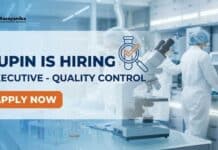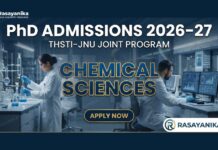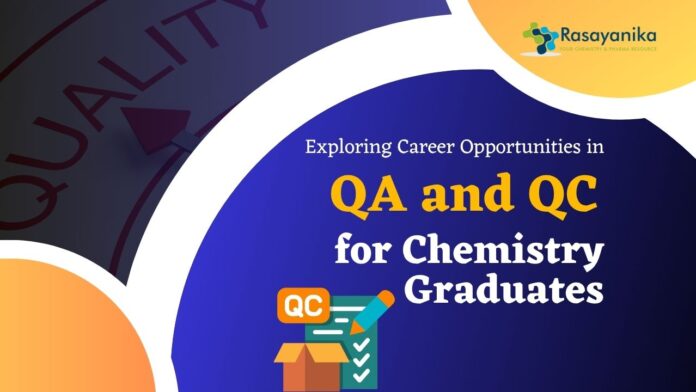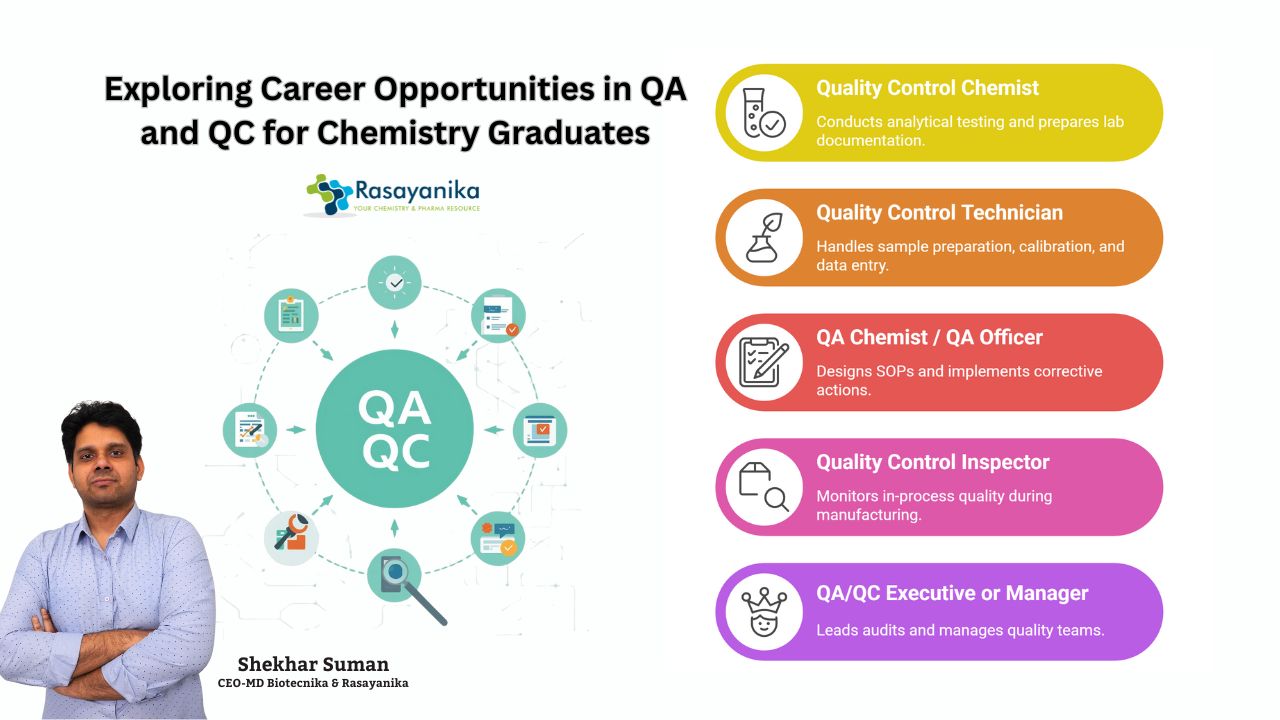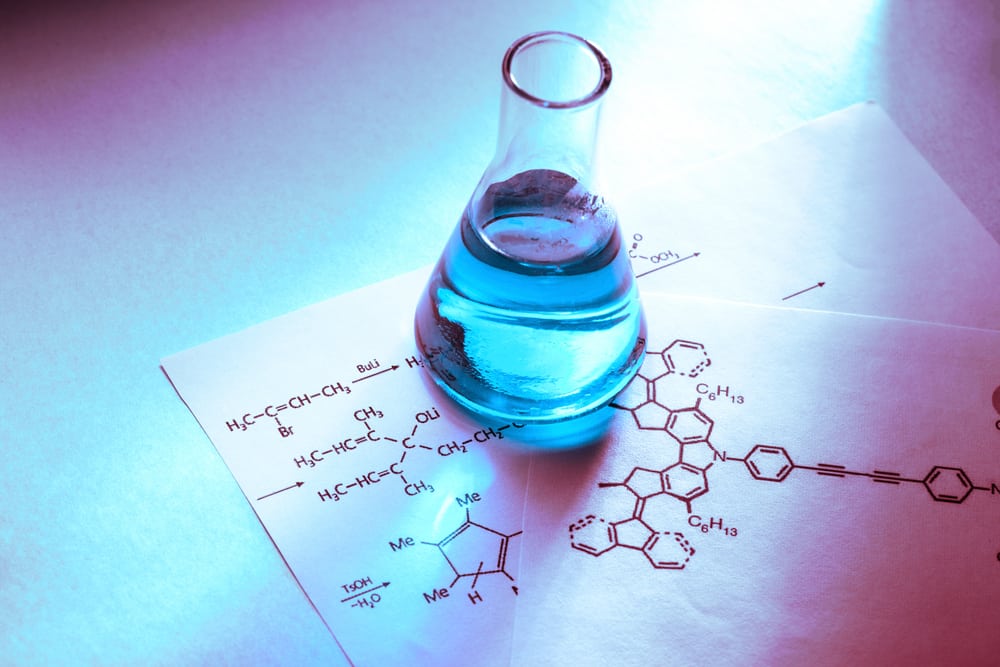Table of Contents
Exploring Career Opportunities in QA and QC for Chemistry Graduates
For many chemistry graduates, stepping into the world of quality assurance (QA) and quality control (QC) might not be the most obvious career path. But it is increasingly one of the most strategic options available. A QA career & QC career help in expanding a chemistry candidate’s analytical skills and build an understanding of regulatory systems. Apart from this, we can also observe that this area helps increase attentiveness as it is one of the major criteria required in quality assurance and control fields. This, in turn, ensures a stable and meaningful scientific rigor.
This article provides insight into QA/QC as a compelling field, what roles chemistry graduates can aim for, and how to build a successful, long-term career in quality.
What Is QA and QC? Why It Matters?
Quality Assurance (QA) and Quality Control (QC) are often discussed in tandem, but there are distinct features and functions we can observe between them.
- QA primarily focuses on designing and maintaining development processes to prevent defects in the product. The primary role involves creating and validating products by standard operating procedures (SOPs). This majorly involves monitoring process metrics, investigating deviations, and instituting corrective and preventive actions.
- QC involves laboratory work and focuses on the product testing process. It consists of testing the raw materials used to develop products. In each step, the QC involves testing of samples as well as the finished products tested for purity. This will help ensure all the products meet the standard specifications.
This distinction is also reflected in quality-management frameworks. Hence, we can easily conclude that QA’s domain is processes and systems, whereas QC’s domain is more oriented towards testing and verification.
Why QA Career & QC Career Are Highly Attractive for Chemistry Graduates
One of the primary reasons for choosing a career in QA and QC is the high demand across various domains. As chemistry graduates are well-versed with analytical techniques and trained to perform experiments that can be highly reliable, they have a high scope of securing a job in the future.
Industries that rely heavily on QA and QC include:
- Pharmaceuticals, where regulatory compliance is paramount
- Environmental services, such as waste-treatment labs (e.g., Veolia’s QA/QC work)
- Manufacturing and specialty chemicals, where product consistency and safety matter
- Food & beverage, where contamination and purity must be tightly controlled
As shown by job portals, there are hundreds of active QA/QC chemist roles globally, underlining consistent demand.
Early Career Entry & Growth
One need not have a PhD degree to gain entry into the QA and QC sectors. With a proper bachelor’s degree in chemistry, one can secure job roles in this sector. Whereas with an advanced master’s degree, one will gain advanced opportunities in this sector.
Various entry-level roles are available in multiple companies and these roles can start with hands-on laboratory work, and as a candidate gains experience, they can shift to more senior positions. Those include designing in the process, audits, and improving the systems as well.
Balance of Scientific Work and Systems Thinking
A QA career & QC career offer a blend of wet-lab science (especially in QC roles) and strategic systems thinking (especially in QA). For someone who enjoys both lab work and process design, this dual access is advantageous.
Key Roles for Chemistry Graduates in QA/QC
Here are some of the prominent roles in this field, tailored to chemistry graduates:
- Quality Control Chemist / Quality Control Analyst: These professionals conduct routine and specialized chemical testing using chromatography (HPLC, GC), spectroscopy, titration, and more. They are responsible for maintaining instruments, analyzing samples, and ensuring GMP (Good Manufacturing Practices) compliance.
- Quality Control Technician: A more execution-oriented role, involving sample preparation, calibration of instruments, documentation, SOP execution, and troubleshooting.
- QA Chemist: Focused on quality systems, auditing, SOP development, root-cause analysis, and corrective/preventive actions (CAPA)
- Quality Assurance & Control Inspector: These professionals often work on the production floor, sampling products, checking in-process quality, and ensuring production lines follow SOPs. (Though specific “inspector” titles may be more common in manufacturing and less in lab-based QC, the function is aligned.)
- QA / QC Manager or Executive: With experience, you can lead quality teams, manage audit readiness, enforce ISO or GMP standards, and drive quality culture.
How to Build a Strong QA Career & QC Career as a Chemistry Graduate
Educational Foundations
- A Bachelor’s degree in Chemistry (or related stream) is typically the minimum required.
- A Master’s degree can give you more technical depth and help you land higher or more specialized roles.
- Certifications or training in ISO standards (e.g., ISO 9001, ISO 17025), GMP, GLP, or quality management systems provide a strong competitive edge.
Technical Skills & Lab Experience
- One should have a proficiency in analytical techniques such as HPLC, GC, UV-Vis spectrophotometry, atomic absorption, titration, etc. Many QC chemist roles demand these skills.
- Experience in method validation, stability testing, and calibration as per GMP guidelines. For instance, QC chemists often run stability studies and prepare detailed reports.
- Familiarity with quality systems: data integrity, deviation management, CAPA, root cause analysis.
Soft Skills & Quality Systems Knowledge
- Strong documentation skills: QA chemists are often tasked with audits, SOP writing, and compliance checks.
- Analytical thinking for investigating deviations or non-conformities.
- Interpersonal skills: QA roles often require auditing, cross-functional coordination, and training.
Gaining Experience
- Internships in pharma / quality labs help you get hands-on exposure.
- Entry-level roles such as a QC technician or QC analyst help build domain experience.
- Project-based academic work: Use university projects (e.g., method development, validation) to highlight your skills on your resume.
- Continuous learning: Take up Six Sigma, Lean, or quality-system certifications to sharpen your understanding.
Career Progression
- After a few years in QC, many chemists move to QA roles by leveraging their technical and documentation experience.
- With enough exposure, you can aim for quality management, regulatory affairs, validation, or audit leadership.
- Cross-functional careers are possible: from QC to R&D, regulatory affairs, or operations, depending on your interest and upskilling.
Challenges and Realities to Consider
A QA career & QC career also comes with tradeoffs, and being aware of them is important:
- Routine Workload
Some QA roles involve a lot of documentation, SOP reviews, and internal auditing rather than lab work. As one QA professional put it, “QA is not chemistry, it’s documentation … QC is the lab side. - Repetitive Testing
QC roles can become routine: repeating assays, following strict SOPs, and generating similar reports. Some people find this monotonous - Career Ceiling Without Upskilling
Without additional training (e.g., in quality systems, audit management, process improvement), growth may plateau. Multiple industry professionals suggest that to move into management or senior QA, one needs more than just day-to-day QC experience. - Regulatory Pressure and Audit Readiness
Especially in regulated industries, QA/QC professionals must remain audit-ready, manage deviations, and ensure compliance with standards such as GMP, ISO, and GLP. This can be stressful, but it is also central to the role.
Many freshers consider the QA and QC careers as substitutes or alternative career options. But the fact that this particular sector creates a distinct pathway for candidates who can balance scientific rigor with systematic thinking. The sector provides opportunities for candidates to apply their chemistry knowledge to ensure safety and regulatory compliance thoroughly.
Just like many other job roles, this area also poses challenges. One such challenge is the tedious documentation processes. Several QA roles often create repetitive QC testing. With these challenges as well, the roles in QA and QC offer opportunities to grow into leadership, validation, regulatory, or process roles, making it a robust long-term choice.
With deliberate skill-building, strong domain knowledge, and a proactive mindset, chemistry graduates can build gratifying careers in quality assurance and control. This is not just another career option, but the role that ensures the safety and efficacy of products that touch millions of lives.










